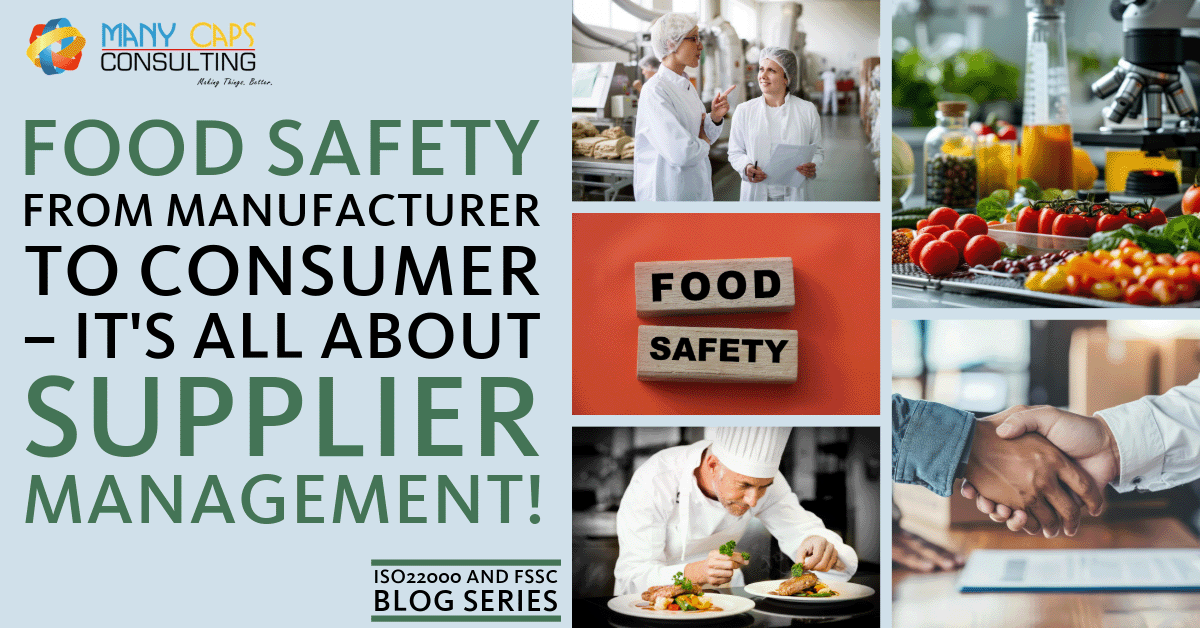Ever wondered how you as food manufacturers or food retailers can ensure that every product you produce or sell is not only tasty, but also safe to eat? One of the key areas is supplier management. Let's have a nosy into what goes on to guarantee food safety for the consumer.
1. Choose Your Suppliers Wisely:
It all starts with selecting suppliers you can rely on.
You need to look for partners who share your commitment to quality and safety, because what they provide forms the foundation of your promise to consumers.This can become increasingly difficult when you are reliant on overseas producers.
One of the key things to do early on is risk analysis.Risk rate your suppliers and use this to home in on those who present the highest concern.
Keep in mind:
- Risk of disease, pathogens etc – is the product they supply you high risk?i.e. temperature control required, historically high rate of illness/incident
- Are they externally accredited – suppliers with recognised certification from a third party, be it BRC, FSSC, ISO 22000 etc are far lower risk than those who have no oversight
- Country of origin – there are big differences in regulations, control of food producers and general best practice in different areas of the world.Do your research on the options available and keep in mind that price won't necessarily give you a good night's sleep!
- Ask for references – who else trades with them, what is their reputation in the marketplace.
2. Setting the Bar:
You shouldn't settle for anything below your minimum safe standards.
Set clear standards for your suppliers, outlining exactly what you expect in terms of ingredient quality, food safety practices, and regulatory compliance and where possible, contract it into your supply agreement with them to ensure a solid foundation for your working relationship.This gives you a good reference point if you find an issue in future.
Supplier questionnaires are standard practice in most industries and can be tailored to your own companies' requirements.Where practical ask for proof of answers; policies, certificates or similar, and ensure their replies are reviewed in detail before engaging them.
Audit where you can – if the supplier is local, put in the time to visit their site and see how they operate.A physical overview will give you a good idea of whether they live up to their values.You may even wish to consider an audit via video call for suppliers you cannot visit in person, particularly if they are high risk or you have concerns.
3. Revisit Regularly
Audits and inspections are like your quality check-ups. They ensure that your suppliers are meeting your standards consistently.
You'll want to have in place proactive monitoring to catch any potential issues before they become a problem. For small or low risk suppliers this may only be on a 2 or 3 yearly basis. For larger suppliers or those you've had issues with, this may be 6 or 12 monthly.BUT DON'T WAIT FOR THE REVIEW! If you have concerns, log them straight away even if it's only small.Being proactive is best for both you and the supplier, in order to stop a small problem becoming a bigger issue.
4. Building Relationships:
Supplier management is not just about rules and regulations—it's about partnerships.
You should work closely with your suppliers, fostering open communication and collaboration. If there is an issue, you want to be certain they will work with you quickly to find a solution rather than try and play down or hide the concern.Collaborate on solutions that work for both parties and be practical, good faith on both sides will drive an open working relationship and having suppliers you can trust makes life a lot simpler and safer.
5. Data is everything!
To keep your customers safe, you need to be able to track everything from farm to factory to shelf, ensuring each step meets your standards for food safety. That means having good systems (digital where possible) that keep note of batch numbers, expiry dates, COAs and other critical information to make sure if the worst happens, tracing and recalling any affected product is easily done. Some of the bigger players in the food industry have extremely strict timelines for recalls (i.e. full detail and tracing in under 2 hrs for some) and the ability to meet this requirement can open doors and provides a level of surety for all your customers.
Keeping the Promise
Food safety isn't just a box to check—it's a promise you make to your customers every single day. It's your commitment to delivering products they can rely on, knowing that food safety is never compromised, and your suppliers play a huge role in that.
So, make sure supplier management is a top priority in your day.
Ready To Start Your ISO22000 Journey?
Make a booking now and find out how we can help you Simplify Compliance, Improve productivity and engage people.
Ready To Start Your ISO9001 Journey?
Make a booking now and find out how we can help you Make Things, Better
Simplify FSSC and ISO22000 with Mango
Stop waisting time with multiple different systems, see how Mango can manage all of your ISO22000 or FSSC requirements in one fully integrated solution.
Make a booking now to see how simple it is to integrate your systems, reduce paperwork, save time and be compliant.
Reclaim your precious time
Copyright
© Many Caps Consultign | All Rights Reserved





Comments